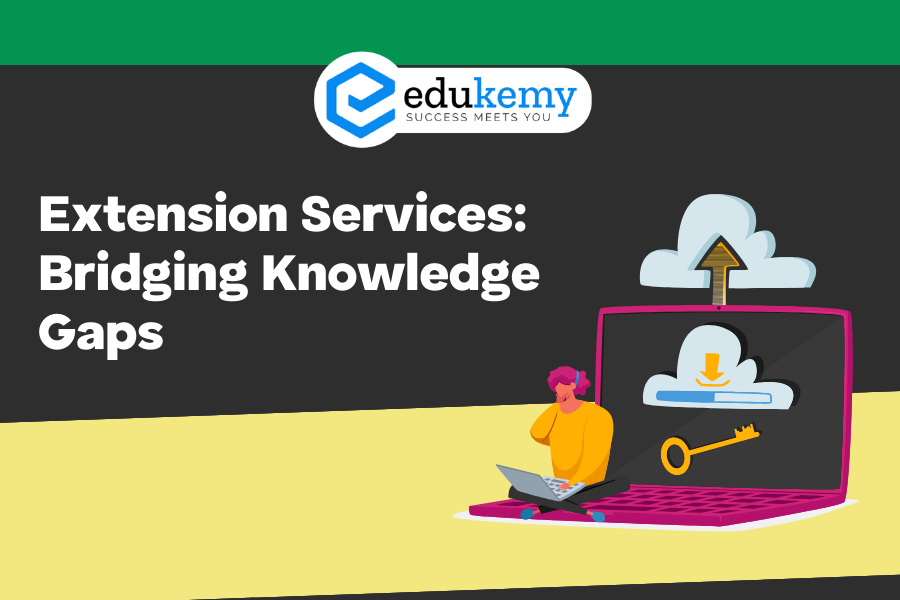
Extension services play a pivotal role in bridging knowledge gaps between experts, researchers, and the broader community. These services act as a vital link, facilitating the transfer of valuable information, technologies, and expertise from academic and research institutions to farmers, businesses, policymakers, and other stakeholders. By providing practical guidance, training, and resources, extension services empower individuals and communities to adopt innovative practices, solve problems, and improve their livelihoods. Through this bridging of knowledge gaps, extension services contribute significantly to the enhancement of agricultural productivity, environmental sustainability, economic development, and overall well-being within societies.
Contents
- 1 Extension Services: Bridging Knowledge Gaps:
- 2 FAQs
- 2.1 1. What are extension services?
- 2.2 2. How do extension services bridge knowledge gaps?
- 2.3 3. What role do extension agents play in extension services?
- 2.4 4. Why are extension services important for sustainable development?
- 2.5 5. How can stakeholders benefit from engaging with extension services?
- 3 In case you still have your doubts, contact us on 9811333901.
Extension Services: Bridging Knowledge Gaps:
- Agricultural extension services apply scientific research to educate farmers, impart awareness about best practices, and provide advisory services.
- Challenges highlighted by the National Commission on Farmers (NCF) include knowledge deficits, collapsed extension services, and reliance on input dealers for technology diffusion.
- Revitalizing the extension system is crucial to linking universities, best practices, and farmers effectively.
Initiatives for Strengthening Extension Services:
- Krishi Vigyan Kendras set up by the Indian Council of Agricultural Research (ICAR) can play a more significant role.
- The Agricultural Technology Management Agency (ATMA) model of extension, promoted by the Department of Agriculture and Cooperation (DAC), is emphasized for delivering results.
- The Department of Agriculture and Cooperation, in collaboration with NABARD, has introduced a scheme for the establishment of agri-clinics/agri-business centers/ventures by agricultural graduates.
Conclusion: Precision agriculture and revitalized extension services contribute to sustainable and efficient farming practices, addressing knowledge gaps and empowering farmers with technology-driven solutions. The integration of digital tools and initiatives strengthens the agriculture sector’s resilience and productivity.
FAQs
1. What are extension services?
Extension services are programs designed to bridge the gap between research findings and practical application, primarily in agriculture, but also in various other fields. These services provide valuable information, training, and resources to farmers, businesses, communities, and individuals to improve their practices, productivity, and livelihoods.
2. How do extension services bridge knowledge gaps?
Extension services act as intermediaries, translating complex research findings into practical knowledge that is accessible and applicable to end-users. They facilitate the dissemination of information through workshops, demonstrations, consultations, and publications, helping stakeholders understand and implement innovative techniques, technologies, and best practices.
3. What role do extension agents play in extension services?
Extension agents, also known as agricultural or outreach advisors, are the frontline professionals who deliver extension services. They engage directly with farmers and other stakeholders, assessing their needs, providing tailored advice, conducting demonstrations, and facilitating access to resources such as seeds, fertilizers, and market information. Extension agents play a crucial role in building trust, fostering relationships, and promoting sustainable practices within communities.
4. Why are extension services important for sustainable development?
Extension services play a vital role in promoting sustainable agricultural practices, environmental stewardship, and economic development. By disseminating knowledge on conservation agriculture, integrated pest management, water conservation, and other sustainable practices, extension services help reduce environmental degradation, enhance resilience to climate change, and improve food security and rural livelihoods in the long term.
5. How can stakeholders benefit from engaging with extension services?
Stakeholders, including farmers, entrepreneurs, policymakers, and communities, can benefit significantly from engaging with extension services. They gain access to up-to-date information, technical expertise, and support networks, enabling them to adopt innovative technologies, improve productivity, mitigate risks, and capitalize on market opportunities. Through collaboration with extension services, stakeholders can enhance their skills, increase their incomes, and contribute to the overall development and well-being of their communities.
In case you still have your doubts, contact us on 9811333901.
For UPSC Prelims Resources, Click here
For Daily Updates and Study Material:
Join our Telegram Channel – Edukemy for IAS
- 1. Learn through Videos – here
- 2. Be Exam Ready by Practicing Daily MCQs – here
- 3. Daily Newsletter – Get all your Current Affairs Covered – here
- 4. Mains Answer Writing Practice – here

